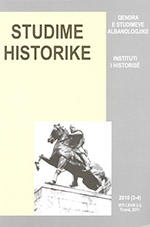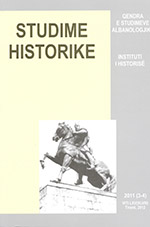
The Contribution of Bajram Curri during the Democratic Movement of 1924
Kontributi i Bajram Currit në Lëvizjen Demokratike tëvitit 1924
Keywords: Contribution of Bajram Curri ; Democratic Movement ; 1924 ; Albania; Albanian History;
Bajram Curri është një ndër figurat e spikatura të historisë sonë kombëtare i cili me veprimtarinë e tij të pasur e të gjithanshme kontribuoi në momente të rëndësishme të historisë së popullit tonë, në luftë për pavarësi dhe shtet kombëtar, për konsolidimin e tij, vendosjen e një rendi demokratik si dhe në përpjekjet për mbrojtjen e të drejtave të shqiptarëve dhe organizimin e një lufte çlirimtare në viset e aneksuara nga shtetet fqinj
More...
